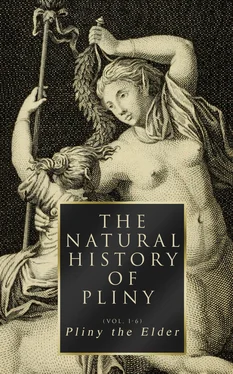I am well aware, that, placed as you are in the highest station, and gifted with the most splendid eloquence and the most accomplished mind, even those who come to pay their respects to you, do it with a kind of veneration: on this account I ought to be careful that what is dedicated to you should be worthy of you. But the country people, and, indeed, some whole nations offer milk to the Gods 50, and those who cannot procure frankincense substitute in its place salted cakes; for the Gods are not dissatisfied when they are worshiped by every one to the best of his ability. But my temerity will appear the greater by the consideration, that these volumes, which I dedicate to you, are of such inferior importance. For they do not admit of the display of genius, nor, indeed, is mine one of the highest order; they admit of no excursions, nor orations, nor discussions, nor of any wonderful adventures, nor any variety of transactions, nor, from the barrenness of the matter, of anything particularly pleasant in the narration, or agreeable to the reader. The nature of things, and life as it actually exists, are described in them; and often the lowest department of it; so that, in very many cases, I am obliged to use rude and foreign, or even barbarous terms, and these often require to be introduced by a kind of preface. And, besides this, my road is not a beaten track, nor one which the mind is much disposed to travel over. There is no one among us who has ever attempted it, nor is there any one individual among the Greeks who has treated of all the topics. Most of us seek for nothing but amusement in our studies, while others are fond of subjects that are of excessive subtilty, and completely involved in obscurity. My object is to treat of all those things which the Greeks include in the Encyclopædia 51, which, however, are either not generally known or are rendered dubious from our ingenious conceits. And there are other matters which many writers have given so much in detail that we quite loathe them. It is, indeed, no easy task to give novelty to what is old, and authority to what is new; brightness to what is become tarnished, and light to what is obscure; to render what is slighted acceptable, and what is doubtful worthy of our confidence; to give to all a natural manner, and to each its peculiar nature. It is sufficiently honourable and glorious to have been willing even to make the attempt, although it should prove unsuccessful. And, indeed, I am of opinion, that the studies of those are more especially worthy of our regard, who, after having overcome all difficulties, prefer the useful office of assisting others to the mere gratification of giving pleasure; and this is what I have already done in some of my former works. I confess it surprises me, that T. Livius, so celebrated an author as he is, in one of the books of his history of the city from its origin, should begin with this remark, “I have now obtained a sufficient reputation, so that I might put an end to my work, did not my restless mind require to be supported by employment 52.” Certainly he ought to have composed this work, not for his own glory, but for that of the Roman name, and of the people who were the conquerors of all other nations. It would have been more meritorious to have persevered in his labours from his love of the work, than from the gratification which it afforded himself, and to have accomplished it, not for his own sake, but for that of the Roman people.
I have included in thirty-six 53books 20,000 topics, all worthy of attention, (for, as Domitius Piso 54says, we ought to make not merely books, but valuable collections,) gained by the perusal of about 2000 volumes, of which a few only are in the hands of the studious, on account of the obscurity of the subjects, procured by the careful perusal of 100 select authors 55; and to these I have made considerable additions of things, which were either not known to my predecessors, or which have been lately discovered. Nor can I doubt but that there still remain many things which I have omitted; for I am a mere mortal, and one that has many occupations. I have, therefore, been obliged to compose this work at interrupted intervals, indeed during the night, so that you will find that I have not been idle even during this period. The day I devote to you, exactly portioning out my sleep to the necessity of my health, and contenting myself with this reward, that while we are musing 56on these subjects (according to the remark of Varro), we are adding to the length of our lives; for life properly consists in being awake.
In consideration of these circumstances and these difficulties, I dare promise nothing; but you have done me the most essential service in permitting me to dedicate my work to you. Nor does this merely give a sanction to it, but it determines its value; for things are often conceived to be of great value, solely because they are consecrated in temples.
I have given a full account of all your family—your Father, yourself, and your Brother, in a history of our own times, beginning where Aufidius Bassus concludes 57. You will ask, Where is it? It has been long completed and its accuracy confirmed 58; but I have determined to commit the charge of it to my heirs, lest I should have been suspected, during my lifetime, of having been unduly influenced by ambition. By this means I confer an obligation on those who occupy the same ground with myself; and also on posterity, who, I am aware, will contend with me, as I have done with my predecessors.
You may judge of my taste from my having inserted, in the beginning of my book, the names of the authors that I have consulted. For I consider it to be courteous and to indicate an ingenuous modesty, to acknowledge the sources whence we have derived assistance, and not to act as most of those have done whom I have examined. For I must inform you, that in comparing various authors with each other, I have discovered, that some of the most grave and of the latest writers have transcribed, word for word, from former works, without making any acknowledgement; not avowedly rivalling them, in the manner of Virgil, or with the candour of Cicero, who, in his treatise “De Republica 59,” professes to coincide in opinion with Plato, and in his Essay on Consolation for his Daughter, says that he follows Crantor, and, in his Offices 60, Panæcius; volumes, which, as you well know, ought not merely to be always in our hands, but to be learned by heart. For it is indeed the mark of a perverted mind and a bad disposition, to prefer being caught in a theft to returning what we have borrowed, especially when we have acquired capital, by usurious interest 61.
The Greeks were wonderfully happy in their titles. One work they called Κηρίον, which means that it was as sweet as a honeycomb; another Κέρας Ἀμαλθείας, or Cornu copiæ, so that you might expect to get even a draught of pigeon’s milk from it 62. Then they have their Flowers, their Muses, Magazines, Manuals, Gardens, Pictures, and Sketches 63, all of them titles for which a man might be tempted even to forfeit his bail. But when you enter upon the works, O ye Gods and Goddesses! how full of emptiness! Our duller countrymen have merely their Antiquities, or their Examples, or their Arts. I think one of the most humorous of them has his Nocturnal Studies 64, a term employed by Bibaculus; a name which he richly deserved 65. Varro, indeed, is not much behind him, when he calls one of his satires A Trick and a Half, and another Turning the Tables 66. Diodorus was the first among the Greeks who laid aside this trifling manner and named his history The Library 67. Apion, the grammarian, indeed—he whom Tiberius Cæsar called the Trumpeter of the World, but would rather seem to be the Bell of the Town-crier 68,—supposed that every one to whom he inscribed any work would thence acquire immortality. I do not regret not having given my work a more fanciful title.
Читать дальше












